


Structures and Monuments in Which Georgia Stone was Used
- Finished Products from Georgia Stone in Ohio
- Cleveland, Ohio – the Cleveland Art Museum (from The Story of Georgia Marble, no date of publication, pp. 16)
- Cleveland, Ohio - the Cleveland Art Museum. (From Yesterday,
Today, and Forever: The Story of Georgia Marble, by the Georgia Marble Company, Tate, Georgia. This material
is used with the permission of the Georgia Marble Company.)
Cleveland Museum of Art (photograph and description of project), presented by the Marble Institute of America.
Scotstone (of Cleveland, Ohio) received a special award for the restoration of the original 1916 terraces and balustrades at the Museum of Modern art. A description of the process that Scotstone following in the restoration and a photograph of the completed project is included. According to the web site, “Elkbrook Bluestone was used as the field stone for the ramp paving and Georgia Cherokee marble for the new retaining walls and paving border stones....” Marble was also used in the 18 replacement banisters, ramp railings and bases, and visitor benches. The stone supplier was Georgia Marble/Polycor. (The architect and general contractors are also listed on this web site.)
- Cleveland, Ohio - the Cleveland Public Library in Downtown Cleveland (constructed
in 1923-1925) (The brochure presents a photograph of the Cleveland Public
Library.) (From Guide to the Building Stones of Downtown Cleveland: A walking tour in celebration of Earth Science Week 2000, by J. T. Hannibal and M. T. Schmidt, Ohio Geological Survey Guidebook No. 5, 33 p., 1992, (Reprinted, 1994.) Building Stones in the Vicinity of Public Square, Cleveland, Ohio, a brochure based on the guidebook, was published in 2000.) (The link from which the following information was obtained is no longer available.)
<http://www.ohiodnr.com/geosurvey/pdf/clevtour.pdf>A white marble with light-gray veining known as Cherokee marble is used as cladding for the building. The Cherokee marble is quarried in the Tate, Georgia, area. North Jay granite (quarried in Maine) is used for the steps of the main entrance. A cream-colored limestone known as Botticino marble (quarried in northern Italy) is used in the interior of the building. Tennessee marble or Holston marble, a pink crystalline limestone, is used for "much of the flooring in the library's corridors." This stone is quarried in the Knoxville, Tennessee, area. The author indicates that travertine is used for the flooring in the main building, but does not indicate the origin of this stone. Cherokee marble is used as a cladding in the Louis Stokes Wing of the library, which was dedicated in 1997. Cherokee marble is also used for the lobby flooring of the Louis Stokes Wing.
More photographs of the Cleveland Public Library are available at this web site. (Scroll down to entry.)
- Cleveland, Ohio - the Cleveland Public Library (from The Story of Georgia Marble, possibly published by the Georgia Marble Co., no date of publication.)
Georgia marble was used in the construction of the Cleveland Public Library building.
- Cleveland, Ohio – the
Commercial Savings and Loan Company Building (Excerpt
from Examples
of Bank Work in Georgia Marble, Georgia
Marble Co., pp. 10.)
- Cleveland, Ohio – the Commercial Savings and Loan Company Building (from Stone, Vol. XLVII, No. 12, December 1926, pp. 730)
- Cleveland, Ohio – the Federal Reserve Bank (Excerpt from Examples of Bank Work in Georgia Marble, Georgia Marble Co., pp. 6.)
- Cleveland, Ohio - the Federal Reserve Bank. (From Yesterday,
Today, and Forever: The Story of Georgia Marble, by the Georgia Marble Company, Tate, Georgia. This material is
used with the permission of the Georgia Marble Company.)
Cleveland, Ohio - the Federal Reserve Bank (from The Story of Georgia Marble, possibly published by the Georgia Marble Co., no date of publication.)
Georgia marble was used in the construction of the Federal Reserve Bank building.
- Cleveland, Ohio - the Federal
Reserve Bank Building, 1923, Construction of the Federal
Reserve Bank of Cleveland c. 1921 - 1923 (photographs). (The links from which this information was obtain are no longer available.)
<http://www.clev.frb.org/bicenten/bldg.htm>
<http://www.clev.frb.org/bicenten/quarry1.htm>- Stone for the Exterior of the Bank. Moose-a-Bec granite, quarried in Stonington, Maine, was used as the base of the bank at the sidewalk level. Etowah marble, a pinkish stone from Tate, Georgia, were used for the remaining exterior. Golden marble from Siena, Italy, was used in the lobby of the bank.
- Cleveland, Ohio – the Guardian Trust Company (Excerpt from Examples of Bank Work in Georgia Marble, Georgia Marble Co., pp. 26.)
-
Cleveland, Ohio – the Museum of Art (Advertisement from Stone, Vol. XXXVIII, No. 7, July 1917, pp. 339)
The Georgia Marble Co., Tate, GA.
Eastern Office: Marbridge Building, New York
Western Office: Guardian Building, Cleveland, Ohio“…We are the sole producers of ‘Creole,’ ‘Mezzotint,’ ‘Silver Gray,’ ‘Cherokee,’ ‘Kennesaw,’ and ‘Etowah’ Marbles. Our quarries are equipped for getting out stock in the largest sizes for monolithic columns, statuary and other important work.
“The Cleveland Art Museum is built entirely of White Georgia Marble from the quarries….”
- Cleveland, Ohio - St. Josaphat Ukrainian Catholic Cathedral (history) (Presented
on the Guide
To Stones Used for Houses of Worship in Northeastern Ohio web site.)
Most of the exterior of the Cathedral is constructed of brick, although Mankato-Kasota stone quarried in the Mankato-Kasota area of Southern Minnesota (a cream-colored, grayish orange dolostone) was also used. In addition, Oconee granite, quarried in Georgia was used.
- Columbus, Ohio - the Ohio Courts Building (photographs and history), presented by Emporis.
White Georgia marble was used for the façade of the Ohio Courts Building. Construction began in 1930 and the building opened 1933.
- Littlestown, Pennsylvania – the Littlestown Savings Institute (Excerpt from Examples of Bank Work in Georgia Marble, Georgia Marble Co., pp. 23.)
- Mansfield, Ohio – the Mechanics Building & Loan Company Building (Excerpt from Examples of Bank Work in Georgia Marble, Georgia Marble Co., pp. 16.)
-
Marion, Ohio – the Warren G. Harding Memorial (“Harding Memorial Nears Completion,” from Stone, Vol. XLIX, No. 2, February 1928, pp. 101)
(excerpts from the article) “The Harding Memorial, that beautiful marble crypt in which lie the bodies of the President and Mrs. Harding, north of the Marion Cemetery at Marion, Ohio, is nearing completion. The large circular structure with its open court and colonnade is ready for dedication except for a few minor details of washing down the marble work….”
“…All of the marble for the memorial was finished ready to set in the mills of the Georgia Marble Company at Tate, Georgia….”
- Marion, Ohio – the Warren G. Harding Memorial (from The Story of Georgia Marble, no date of publication, pp. 13)
- Marion, Ohio - the Warren G. Harding Memorial. (From Yesterday, Today, and Forever: The Story of Georgia Marble, by the Georgia Marble Company, Tate, Georgia. This material is used with the permission of the Georgia Marble Company.)
- The Marion G. Harding Memorial (photograph and history), presented by the WOSU Stations.
(The link from which the following informaion was obtained is no longer available, although you can view the page on the Internet Archive Wayback Machine.)
<http://www.wosu.org/television/local-programs/program-buckeye/>White Georgia marble was used for the construction of the memorial that was designed in the classic Greek style. It was built in the 1920s.
- Niles, Ohio – the
President McKinley Memorial (from The Story of
Georgia Marble, no date of publication, pp. 13)
- Niles, Ohio - the McKinley Memorial. (From Yesterday,
Today, and Forever: The Story of Georgia Marble,
by the Georgia Marble Company, Tate, Georgia. This
material is used with the permission of the Georgia Marble
Company.)
- Niles, Ohio - the McKinley Memorial. (From Yesterday,
Today, and Forever: The Story of Georgia Marble,
by the Georgia Marble Company, Tate, Georgia. This
material is used with the permission of the Georgia Marble
Company.)
- Youngstown, Ohio – the Dollar Savings Bank Company Building (Excerpt from Examples of Bank Work in Georgia Marble, Georgia Marble Co., pp. 20.)
- Youngstown, Ohio - the Statue of Apollo, Butler Art Building.
Statue of Georgia Marble.
(From Yesterday,
Today, and Forever: The
Story of Georgia Marble
Co. This
material is used with
the permission of the
Georgia Marble Company.)
Georgia marble was used in the construction of the Statue of Apollo.
- Youngstown, Ohio - the Statue of Minerva, Butler Art Building.
Statue of Georgia Marble.
(From Yesterday,
Today, and Forever:
The Story of Georgia
Marble Co. This material is used
with the permission
of the Georgia Marble
Company.)
Georgia marble was used in the construction of the Statue of Minerva.
“Commercial Savings & Loan Company Building Cleveland, Ohio. Exterior of Georgia Marble furnished by the Georgia Marble Company. Architects: Walker and Weeks.” 
“Rear view of the Harding Memorial showing wall of the open crypt, which, like the remainder of the structure, is Georgia Marble.” 
Commercial use of material within this site is strictly prohibited. It is not to be captured, reworked, and placed inside another web site ©. All rights reserved. Peggy B. and George (Pat) Perazzo.

















